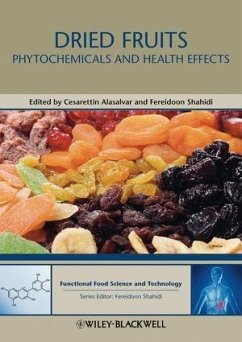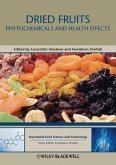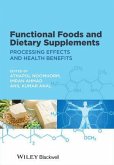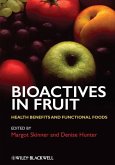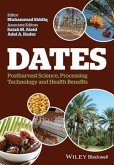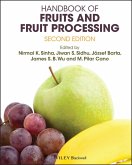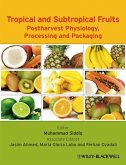Dried Fruits (eBook, ePUB)
Phytochemicals and Health Effects
Redaktion: Alasalvar, Cesarettin


Alle Infos zum eBook verschenken

Dried Fruits (eBook, ePUB)
Phytochemicals and Health Effects
Redaktion: Alasalvar, Cesarettin
- Format: ePub
- Merkliste
- Auf die Merkliste
- Bewerten Bewerten
- Teilen
- Produkt teilen
- Produkterinnerung
- Produkterinnerung

Hier können Sie sich einloggen

Bitte loggen Sie sich zunächst in Ihr Kundenkonto ein oder registrieren Sie sich bei bücher.de, um das eBook-Abo tolino select nutzen zu können.
Dried fruits serve as important healthful snack items around the world. They provide a concentrated form of fresh fruits, prepared by different drying techniques. With their unique combination of taste/aroma, essential nutrients, fibre, and phytochemicals or bioactive compounds, dried fruits are convenient for healthy eating and can bridge the gap between recommended intake of fruits and actual consumption. Dried fruits are nutritionally equivalent to fresh fruits, in smaller serving sizes, in the current dietary recommendations of various countries. Scientific evidence suggests that…mehr
- Geräte: eReader
- mit Kopierschutz
- eBook Hilfe
- Größe: 6.15MB
![Dried Fruits (eBook, PDF) Dried Fruits (eBook, PDF)]() Fereidoon ShahidiDried Fruits (eBook, PDF)193,99 €
Fereidoon ShahidiDried Fruits (eBook, PDF)193,99 €![Functional Foods and Dietary Supplements (eBook, ePUB) Functional Foods and Dietary Supplements (eBook, ePUB)]() Functional Foods and Dietary Supplements (eBook, ePUB)151,99 €
Functional Foods and Dietary Supplements (eBook, ePUB)151,99 €![Bioactives in Fruit (eBook, ePUB) Bioactives in Fruit (eBook, ePUB)]() Bioactives in Fruit (eBook, ePUB)154,99 €
Bioactives in Fruit (eBook, ePUB)154,99 €![Dates (eBook, ePUB) Dates (eBook, ePUB)]() Dates (eBook, ePUB)152,99 €
Dates (eBook, ePUB)152,99 €![Handbook of Fruits and Fruit Processing (eBook, ePUB) Handbook of Fruits and Fruit Processing (eBook, ePUB)]() Handbook of Fruits and Fruit Processing (eBook, ePUB)222,99 €
Handbook of Fruits and Fruit Processing (eBook, ePUB)222,99 €![Tropical and Subtropical Fruits (eBook, ePUB) Tropical and Subtropical Fruits (eBook, ePUB)]() Tropical and Subtropical Fruits (eBook, ePUB)230,99 €
Tropical and Subtropical Fruits (eBook, ePUB)230,99 €![Modified Atmosphere Packaging for Fresh-Cut Fruits and Vegetables (eBook, ePUB) Modified Atmosphere Packaging for Fresh-Cut Fruits and Vegetables (eBook, ePUB)]() Modified Atmosphere Packaging for Fresh-Cut Fruits and Vegetables (eBook, ePUB)212,99 €
Modified Atmosphere Packaging for Fresh-Cut Fruits and Vegetables (eBook, ePUB)212,99 €-
-
-
Dieser Download kann aus rechtlichen Gründen nur mit Rechnungsadresse in A, B, BG, CY, CZ, D, DK, EW, E, FIN, F, GR, HR, H, IRL, I, LT, L, LR, M, NL, PL, P, R, S, SLO, SK ausgeliefert werden.
- Produktdetails
- Verlag: John Wiley & Sons
- Seitenzahl: 508
- Erscheinungstermin: 18. Dezember 2012
- Englisch
- ISBN-13: 9781118464649
- Artikelnr.: 37347338
- Verlag: John Wiley & Sons
- Seitenzahl: 508
- Erscheinungstermin: 18. Dezember 2012
- Englisch
- ISBN-13: 9781118464649
- Artikelnr.: 37347338
beneficial health effects of dried fruits: an overview 1 Cesarettin
Alasalvar and Fereidoon Shahidi 1.1 Introduction 1 1.2 Compositional and
nutritional characteristics of dried fruits 2 1.3 Phytochemicals in dried
fruits 6 1.4 Beneficial health effects of dried fruits 13 1.5 Commercial
products and industrial applications of dried fruits 14 1.6 Conclusions 14
References 15 2 Cancer chemopreventive effects of selected dried fruits 19
Joydeb Kumar Kundu and Young-Joon Surh 2.1 Chemoprevention: an overview 19
2.2 The promise of dried fruits in cancer prevention 19 2.3 Dried fruits as
a potential source of chemopreventive phytochemicals 21 2.4 Biochemical
basis of chemoprevention with dried fruits 21 2.5 Chemopreventive
properties of bioactive substances derived from selected dried fruits 24
2.6 Conclusions 39 Acknowledgments 40 References 40 PART 1 DRIED BERRIES 3
Phytochemicals and health benefits of blackberries and black currants 55
Haiming Shi and Liangli (Lucy) Yu 3.1 Introduction 55 3.2 Compositional and
nutritional characteristics of blackberries and black currants 55 3.3
Phytochemicals in blackberries and black currants 58 3.4 Health benefits of
blackberries and black currants 66 3.5 Commercial products and industrial
applications of blackberries and black currants 68 3.6 Drying effects on
antioxidant capacities and phenolics of blackberries and black currants 69
3.7 Conclusions 70 References 70 4 Dried blueberries: the effects of
processing on health-promoting compounds 75 William L. Kerr 4.1
Introduction 75 4.2 Varieties and composition 76 4.3 Compositional and
nutritional characteristics of blueberries 77 4.4 Phytochemicals 79 4.5
Health effects related to blueberries 83 4.6 Effects of processing on
blueberry components 88 4.7 Conclusions 94 References 94 5 Functional
characteristics of dried cranberries 101 K.M. Schaich 5.1 Introduction 101
5.2 Composition and nutritional characteristics of dried cranberry powder
102 5.3 Natural antioxidants in dried cranberry powder 113 5.4 Health
effects of dried cranberry powders 116 5.5 Food applications of dried
cranberry powders 123 5.6 Conclusions 126 References 126 6 Phytochemicals
and health benefits of goji berries 133 Ying Zhong, Fereidoon Shahidi, and
Marian Naczk 6.1 Introduction 133 6.2 Functional components in goji berries
134 6.3 Health benefits of goji berries 139 6.4 Conclusions 141 References
141 7 Dried mulberries: phytochemicals and health effects 145 Mine Gultekin
Ozguven and Beraat Ozcelik 7.1 Introduction 145 7.2 Drying of mulberries
146 7.3 Compositional and nutritional characteristics of mulberries 146 7.4
Phytochemicals in mulberries and their by-products 148 7.5 Natural
antioxidants in mulberries 151 7.6 Health effects of mulberries 153 7.7
Food application of mulberries and their by-products 155 7.8 Conclusions
156 References 157 8 Dried raspberries: phytochemicals and health effects
161 Esteban I. Mejia-Meza, Jaime A. Yáñez, Neal M. Davies, and Carter D.
Clary 8.1 Introduction 161 8.2 Dehydration of raspberries 161 8.3
Phytochemicals in dried raspberries 162 8.4 Antioxidants in dried
raspberries 169 8.5 Health benefits of dried raspberries 171 8.6
Conclusions 172 References 172 9 Phytochemical antioxidants and health
benefits of dried strawberries 175 Rong Tsao and Hongyan Li 9.1
Introduction 175 9.2 Phytochemicals 176 9.3 Factors affecting
phytochemicals 180 9.4 Health benefits of strawberries 182 9.5 Conclusions
186 References 186 10 Beneficial effects of dried berry fruits in human
health and disease prevention 192 Shirley Zafra-Stone, Manashi Bagchi, and
Debasis Bagchi 10.1 Introduction 192 10.2 Antioxidant protection 193 10.3
Cardiovascular health and metabolic syndrome 193 10.4 Neuroprotection 196
10.5 Anticancer activity 197 10.6 Helicobacter pylori and inflammatory
response 203 10.7 Diabetes and vision 204 10.8 Conclusions 205 References
205 PART 2 NONTROPICAL DRIED FRUITS 11 Phytochemicals and health benefits
of dried apple snacks 213 H.P. Vasantha Rupasinghe and Ajit P.K. Joshi 11.1
Introduction 213 11.2 Food applications of dried apple snacks 213 11.3
Effects of drying methods and vacuum impregnation (VI) on apple
phytochemicals 214 11.4 Antioxidant capacity of dried apple snacks 217 11.5
Compositional and nutritional characteristics of dried apple snacks 220
11.6 Health benefits of fresh and dried apples 222 11.7 Conclusions 222
References 223 12 Phytochemicals and health benefits of dried apricots 226
Neslihan Göncüolu, Burçe Ataç Mogol, and Vural Gökmen 12.1 Introduction 226
12.2 Production 226 12.3 Compositional and nutritional characteristics of
dried apricots 228 12.4 Phytochemicals in dried apricots 229 12.5
Antioxidant activity of dried apricots 232 12.6 Chemical changes during
drying of apricots 233 12.7 Effects of sulfur treatment on phytochemical
content of apricots 234 12.8 Health benefits of dried apricots 236 12.9
Conclusions 239 References 239 13 Dried cherries: phytochemicals and health
perspectives 243 Letitia McCune 13.1 Introduction 243 13.2 Production 243
13.3 Methods of drying 244 13.4 Nutritional characteristics 245 13.5
Antioxidant phytochemicals 246 13.6 Health benefits 248 13.7 Conclusions
253 References 253 14 Dried citrus fruits: phytochemicals and health
beneficial effects 258 Tzou-Chi Huang and Chi-Tang Ho 14.1 Introduction 258
14.2 Compositional and nutritional characteristics of citrus 259 14.3
Phytochemicals in citrus 259 14.4 Health effects of dried citrus peels 267
14.5 Food application of citrus and their by-products 274 14.6 Conclusions
276 References 276 15 Functional characteristics of dried figs 284
Cesarettin Alasalvar 15.1 Introduction 284 15.2 Compositional and
nutritional characteristics of fresh and dried figs 284 15.3 Phytochemicals
in dried figs 288 15.4 Health benefits of dried figs 296 15.5 Conclusions
296 References 297 16 Drying nectarines: functional compounds and
antioxidant potential 300 Daniel Valero, Huertas María Díaz-Mula, and María
Serrano 16.1 Introduction 300 16.2 How to dry nectarines 301 16.3
Compositional and nutritional characteristics of dried nectarines 301 16.4
Phytochemicals in dried nectarines 303 16.5 Health benefits of dried
nectarines 305 16.6 Commercial products and industrial applications of
dried nectarines 306 16.7 Conclusions 306 References 306 17 Phytochemical
composition and health aspects of peach products 309 Emilio
Alvarez-Parrilla, Laura A. de la Rosa, Gustavo A. González-Aguilar, and
Jesús F. Ayala-Zavala 17.1 Introduction 309 17.2 Compositional and
nutritional changes of peaches during dehydration 310 17.3 Phytochemicals
in fresh and processed peaches 312 17.4 Health effects of peaches 318 17.5
Dry peaches and their by-products 320 17.6 Conclusions 321 Acknowledgments
321 References 321 18 Dried pears: phytochemicals and potential health
effects 325 Lisete Silva, Fereidoon Shahidi, and Manuel A. Coimbra 18.1
Introduction 325 18.2 Phytochemicals in pears 326 18.3 Changes in
phytochemical compounds during drying of pears 333 18.4 Bioavailability and
potential health effects 338 18.5 Conclusions 346 References 347 19 Prunes:
are they functional foods? 357 Alessandra Del Caro and Antonio Piga 19.1
Introduction 357 19.2 Compositional and nutritional characteristics of
prunes 358 19.3 Phytochemicals in prunes and their by-products 360 19.4
Natural antioxidant in prunes 362 19.5 Health effects of prunes 363 19.6
Food application of prunes and their by-products 365 19.7 Conclusions 366
References 366 20 Raisins: processing, phytochemicals, and health benefits
372 Fereidoon Shahidi and Zhuliang Tan 20.1 Introduction 372 20.2 Types of
raisins 372 20.3 Processing of raisins 373 20.4 Composition of raisins 376
20.5 Phytochemicals in raisins 377 20.6 Bioactivities and health benefits
of raisins 384 20.7 Conclusions 387 References 388 PART 3 TROPICAL DRIED
FRUITS 21 Açai fruits: potent antioxidant and anti-inflammatory superfruits
with potential health benefits 395 Alexander G. Schauss 21.1 Introduction
395 21.2 Compositional and nutrition characteristics of açai fruits 396
21.3 Antioxidant and anti-inflammatory activities of açai fruits 398 21.4
Phytochemicals in açai fruits 402 21.5 Processing of açai fruits for
value-added products 406 21.6 Conclusions 408 References 409 22 Bananas,
dried bananas, and banana chips: nutritional characteristics,
phytochemicals, and health effects 414 Arianna Carughi 22.1 Introduction
414 22.2 Production and consumption 414 22.3 Dried bananas or banana figs
415 22.4 Dried and fried banana chips (crisps) 416 22.5 Nutritional content
of bananas, dried bananas, and banana chips 416 22.6 Phytochemicals in
bananas and dried fruit products 421 22.7 Potential health benefits of
dried bananas 423 22.8 Conclusions 424 References 424 23 Nutritional
composition, phytochemicals, and health benefits of dates 428 Cesarettin
Alasalvar and Fereidoon Shahidi 23.1 Introduction 428 23.2 Compositional
and nutritional characteristics of fresh and dried dates 429 23.3
Phytochemicals in fresh and dried dates 432 23.4 Health benefits of dates
438 23.5 Food application of dates, syrups, and their byproducts 439 23.6
Conclusions 440 References 440 24 Neutraceutical properties of dried
tropical fruits: guavas and papayas 444 K. Nagendra Prasad, Azrina Azlan,
and Barakatun Nisak Mohd Yusof 24.1 Introduction 444 24.2 Guavas 445 24.3
Papayas 449 24.4 Conclusions 453 Acknowledgments 453 References 453 25
Dried mangoes: phytochemicals, antioxidant properties, and health benefits
457 Fouad Abdulrahman Hassan, Sadeq Hasan Al-Sheraji, and Amin Ismail 25.1
Introduction 457 25.2 Compositional and nutritional characteristics of
dried mangoes 458 25.3 Phytochemicals and antioxidant activity of dried
mangoes 460 25.4 Health benefits of dried mangoes 465 25.5 Conclusions 466
References 466 26 Phytochemicals and health applications of dried passion
and pineapple fruits 471 Jian Sun, Li Li, Xiangrong You, Changbao Li,
Zhichun Li, and Fen Liao 26.1 Introduction 471 26.2 Compositional and
nutritional characteristics of dried passion and pineapple fruits 472 26.3
Phytochemicals in dried passion and pineapple fruits 473 26.4 Health
benefits of dried passion and pineapple fruits 479 26.5 Commercial products
and industrial applications of dried passion and pineapple fruits 482 26.6
Conclusions 482 Acknowledgments 482 References 483 Color plate section
located between pages 356 and 357 Index 486
beneficial health effects of dried fruits: an overview 1 Cesarettin
Alasalvar and Fereidoon Shahidi 1.1 Introduction 1 1.2 Compositional and
nutritional characteristics of dried fruits 2 1.3 Phytochemicals in dried
fruits 6 1.4 Beneficial health effects of dried fruits 13 1.5 Commercial
products and industrial applications of dried fruits 14 1.6 Conclusions 14
References 15 2 Cancer chemopreventive effects of selected dried fruits 19
Joydeb Kumar Kundu and Young-Joon Surh 2.1 Chemoprevention: an overview 19
2.2 The promise of dried fruits in cancer prevention 19 2.3 Dried fruits as
a potential source of chemopreventive phytochemicals 21 2.4 Biochemical
basis of chemoprevention with dried fruits 21 2.5 Chemopreventive
properties of bioactive substances derived from selected dried fruits 24
2.6 Conclusions 39 Acknowledgments 40 References 40 PART 1 DRIED BERRIES 3
Phytochemicals and health benefits of blackberries and black currants 55
Haiming Shi and Liangli (Lucy) Yu 3.1 Introduction 55 3.2 Compositional and
nutritional characteristics of blackberries and black currants 55 3.3
Phytochemicals in blackberries and black currants 58 3.4 Health benefits of
blackberries and black currants 66 3.5 Commercial products and industrial
applications of blackberries and black currants 68 3.6 Drying effects on
antioxidant capacities and phenolics of blackberries and black currants 69
3.7 Conclusions 70 References 70 4 Dried blueberries: the effects of
processing on health-promoting compounds 75 William L. Kerr 4.1
Introduction 75 4.2 Varieties and composition 76 4.3 Compositional and
nutritional characteristics of blueberries 77 4.4 Phytochemicals 79 4.5
Health effects related to blueberries 83 4.6 Effects of processing on
blueberry components 88 4.7 Conclusions 94 References 94 5 Functional
characteristics of dried cranberries 101 K.M. Schaich 5.1 Introduction 101
5.2 Composition and nutritional characteristics of dried cranberry powder
102 5.3 Natural antioxidants in dried cranberry powder 113 5.4 Health
effects of dried cranberry powders 116 5.5 Food applications of dried
cranberry powders 123 5.6 Conclusions 126 References 126 6 Phytochemicals
and health benefits of goji berries 133 Ying Zhong, Fereidoon Shahidi, and
Marian Naczk 6.1 Introduction 133 6.2 Functional components in goji berries
134 6.3 Health benefits of goji berries 139 6.4 Conclusions 141 References
141 7 Dried mulberries: phytochemicals and health effects 145 Mine Gultekin
Ozguven and Beraat Ozcelik 7.1 Introduction 145 7.2 Drying of mulberries
146 7.3 Compositional and nutritional characteristics of mulberries 146 7.4
Phytochemicals in mulberries and their by-products 148 7.5 Natural
antioxidants in mulberries 151 7.6 Health effects of mulberries 153 7.7
Food application of mulberries and their by-products 155 7.8 Conclusions
156 References 157 8 Dried raspberries: phytochemicals and health effects
161 Esteban I. Mejia-Meza, Jaime A. Yáñez, Neal M. Davies, and Carter D.
Clary 8.1 Introduction 161 8.2 Dehydration of raspberries 161 8.3
Phytochemicals in dried raspberries 162 8.4 Antioxidants in dried
raspberries 169 8.5 Health benefits of dried raspberries 171 8.6
Conclusions 172 References 172 9 Phytochemical antioxidants and health
benefits of dried strawberries 175 Rong Tsao and Hongyan Li 9.1
Introduction 175 9.2 Phytochemicals 176 9.3 Factors affecting
phytochemicals 180 9.4 Health benefits of strawberries 182 9.5 Conclusions
186 References 186 10 Beneficial effects of dried berry fruits in human
health and disease prevention 192 Shirley Zafra-Stone, Manashi Bagchi, and
Debasis Bagchi 10.1 Introduction 192 10.2 Antioxidant protection 193 10.3
Cardiovascular health and metabolic syndrome 193 10.4 Neuroprotection 196
10.5 Anticancer activity 197 10.6 Helicobacter pylori and inflammatory
response 203 10.7 Diabetes and vision 204 10.8 Conclusions 205 References
205 PART 2 NONTROPICAL DRIED FRUITS 11 Phytochemicals and health benefits
of dried apple snacks 213 H.P. Vasantha Rupasinghe and Ajit P.K. Joshi 11.1
Introduction 213 11.2 Food applications of dried apple snacks 213 11.3
Effects of drying methods and vacuum impregnation (VI) on apple
phytochemicals 214 11.4 Antioxidant capacity of dried apple snacks 217 11.5
Compositional and nutritional characteristics of dried apple snacks 220
11.6 Health benefits of fresh and dried apples 222 11.7 Conclusions 222
References 223 12 Phytochemicals and health benefits of dried apricots 226
Neslihan Göncüolu, Burçe Ataç Mogol, and Vural Gökmen 12.1 Introduction 226
12.2 Production 226 12.3 Compositional and nutritional characteristics of
dried apricots 228 12.4 Phytochemicals in dried apricots 229 12.5
Antioxidant activity of dried apricots 232 12.6 Chemical changes during
drying of apricots 233 12.7 Effects of sulfur treatment on phytochemical
content of apricots 234 12.8 Health benefits of dried apricots 236 12.9
Conclusions 239 References 239 13 Dried cherries: phytochemicals and health
perspectives 243 Letitia McCune 13.1 Introduction 243 13.2 Production 243
13.3 Methods of drying 244 13.4 Nutritional characteristics 245 13.5
Antioxidant phytochemicals 246 13.6 Health benefits 248 13.7 Conclusions
253 References 253 14 Dried citrus fruits: phytochemicals and health
beneficial effects 258 Tzou-Chi Huang and Chi-Tang Ho 14.1 Introduction 258
14.2 Compositional and nutritional characteristics of citrus 259 14.3
Phytochemicals in citrus 259 14.4 Health effects of dried citrus peels 267
14.5 Food application of citrus and their by-products 274 14.6 Conclusions
276 References 276 15 Functional characteristics of dried figs 284
Cesarettin Alasalvar 15.1 Introduction 284 15.2 Compositional and
nutritional characteristics of fresh and dried figs 284 15.3 Phytochemicals
in dried figs 288 15.4 Health benefits of dried figs 296 15.5 Conclusions
296 References 297 16 Drying nectarines: functional compounds and
antioxidant potential 300 Daniel Valero, Huertas María Díaz-Mula, and María
Serrano 16.1 Introduction 300 16.2 How to dry nectarines 301 16.3
Compositional and nutritional characteristics of dried nectarines 301 16.4
Phytochemicals in dried nectarines 303 16.5 Health benefits of dried
nectarines 305 16.6 Commercial products and industrial applications of
dried nectarines 306 16.7 Conclusions 306 References 306 17 Phytochemical
composition and health aspects of peach products 309 Emilio
Alvarez-Parrilla, Laura A. de la Rosa, Gustavo A. González-Aguilar, and
Jesús F. Ayala-Zavala 17.1 Introduction 309 17.2 Compositional and
nutritional changes of peaches during dehydration 310 17.3 Phytochemicals
in fresh and processed peaches 312 17.4 Health effects of peaches 318 17.5
Dry peaches and their by-products 320 17.6 Conclusions 321 Acknowledgments
321 References 321 18 Dried pears: phytochemicals and potential health
effects 325 Lisete Silva, Fereidoon Shahidi, and Manuel A. Coimbra 18.1
Introduction 325 18.2 Phytochemicals in pears 326 18.3 Changes in
phytochemical compounds during drying of pears 333 18.4 Bioavailability and
potential health effects 338 18.5 Conclusions 346 References 347 19 Prunes:
are they functional foods? 357 Alessandra Del Caro and Antonio Piga 19.1
Introduction 357 19.2 Compositional and nutritional characteristics of
prunes 358 19.3 Phytochemicals in prunes and their by-products 360 19.4
Natural antioxidant in prunes 362 19.5 Health effects of prunes 363 19.6
Food application of prunes and their by-products 365 19.7 Conclusions 366
References 366 20 Raisins: processing, phytochemicals, and health benefits
372 Fereidoon Shahidi and Zhuliang Tan 20.1 Introduction 372 20.2 Types of
raisins 372 20.3 Processing of raisins 373 20.4 Composition of raisins 376
20.5 Phytochemicals in raisins 377 20.6 Bioactivities and health benefits
of raisins 384 20.7 Conclusions 387 References 388 PART 3 TROPICAL DRIED
FRUITS 21 Açai fruits: potent antioxidant and anti-inflammatory superfruits
with potential health benefits 395 Alexander G. Schauss 21.1 Introduction
395 21.2 Compositional and nutrition characteristics of açai fruits 396
21.3 Antioxidant and anti-inflammatory activities of açai fruits 398 21.4
Phytochemicals in açai fruits 402 21.5 Processing of açai fruits for
value-added products 406 21.6 Conclusions 408 References 409 22 Bananas,
dried bananas, and banana chips: nutritional characteristics,
phytochemicals, and health effects 414 Arianna Carughi 22.1 Introduction
414 22.2 Production and consumption 414 22.3 Dried bananas or banana figs
415 22.4 Dried and fried banana chips (crisps) 416 22.5 Nutritional content
of bananas, dried bananas, and banana chips 416 22.6 Phytochemicals in
bananas and dried fruit products 421 22.7 Potential health benefits of
dried bananas 423 22.8 Conclusions 424 References 424 23 Nutritional
composition, phytochemicals, and health benefits of dates 428 Cesarettin
Alasalvar and Fereidoon Shahidi 23.1 Introduction 428 23.2 Compositional
and nutritional characteristics of fresh and dried dates 429 23.3
Phytochemicals in fresh and dried dates 432 23.4 Health benefits of dates
438 23.5 Food application of dates, syrups, and their byproducts 439 23.6
Conclusions 440 References 440 24 Neutraceutical properties of dried
tropical fruits: guavas and papayas 444 K. Nagendra Prasad, Azrina Azlan,
and Barakatun Nisak Mohd Yusof 24.1 Introduction 444 24.2 Guavas 445 24.3
Papayas 449 24.4 Conclusions 453 Acknowledgments 453 References 453 25
Dried mangoes: phytochemicals, antioxidant properties, and health benefits
457 Fouad Abdulrahman Hassan, Sadeq Hasan Al-Sheraji, and Amin Ismail 25.1
Introduction 457 25.2 Compositional and nutritional characteristics of
dried mangoes 458 25.3 Phytochemicals and antioxidant activity of dried
mangoes 460 25.4 Health benefits of dried mangoes 465 25.5 Conclusions 466
References 466 26 Phytochemicals and health applications of dried passion
and pineapple fruits 471 Jian Sun, Li Li, Xiangrong You, Changbao Li,
Zhichun Li, and Fen Liao 26.1 Introduction 471 26.2 Compositional and
nutritional characteristics of dried passion and pineapple fruits 472 26.3
Phytochemicals in dried passion and pineapple fruits 473 26.4 Health
benefits of dried passion and pineapple fruits 479 26.5 Commercial products
and industrial applications of dried passion and pineapple fruits 482 26.6
Conclusions 482 Acknowledgments 482 References 483 Color plate section
located between pages 356 and 357 Index 486
